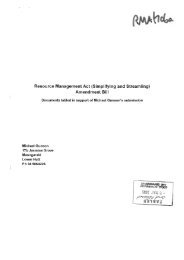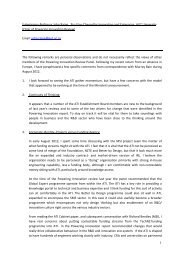(TAKUTAI MOANA) BILL E kau I te wai e, e kau I te wa
(TAKUTAI MOANA) BILL E kau I te wai e, e kau I te wa
(TAKUTAI MOANA) BILL E kau I te wai e, e kau I te wa
You also want an ePaper? Increase the reach of your titles
YUMPU automatically turns print PDFs into web optimized ePapers that Google loves.
question is, how much more dredging will happen to accommoda<strong>te</strong> their<br />
needs, and at what expense to our cultural and spiritual associations with<br />
our maunga Mauao and our moana Te A<strong>wa</strong>nui?<br />
In the process of accommodating the whims of the rich, we have also<br />
witnessed the building of two marinas – a continued clut<strong>te</strong>ring of the<br />
harbour itself. Certainly the congestion of the harbour as we now see it<br />
today, shows a comple<strong>te</strong> disregard for the lived experiences and<br />
in<strong>te</strong>ractions, needs and thoughts of others who care about the harbour<br />
and its once pristine condition.<br />
These significant factors have impac<strong>te</strong>d severly and changed the whole<br />
face of the harbour itself. Seafood is no longer available in the<br />
abundance I experienced as a child, and if it is, it comes with algae bloom<br />
as a result of the pollution. We only need ask those who were affec<strong>te</strong>d<br />
by shellfish poisoning, they gathered from within the harbour as recent as<br />
2-3 months ago. Our Kaupapa Māori Health services within Ranginui iwi<br />
receive upda<strong>te</strong>s from Toi Te Ora: Public Health, that <strong>te</strong>ll us where rāhui<br />
have been placed in and around the harbour as a result of contamina<strong>te</strong>d<br />
shell food.<br />
I of<strong>te</strong>n ask myself ‘what does it mean, that in today’s society, what is<br />
happening? A lot of seafood and shellfish that we relied on is no more,<br />
particularly within the inner harbour itself.<br />
To answer my own question I must turn to the beliefs and values which I<br />
have been raised with and compare these with those of the decisionmakers<br />
of today who have continually allowed these violations to take<br />
place, and in doing so show total disregard for me, my whanau, hapu, iwi<br />
and culture.<br />
I reflect on the following excerpt from a famous speech made by Taiaho<br />
Hori Ngatai of Tauranga Moana in 1885 which is set out here because in<br />
the words of the Waitangi Tribunal it ‘precisely captures the charac<strong>te</strong>r<br />
and significance of Maori traditional rights to the foreshore and its<br />
fisheries, and the nature of rangatiratanga pro<strong>te</strong>c<strong>te</strong>d by the Treaty’: 3<br />
Now, with regard to the land below high-<strong>wa</strong><strong>te</strong>r mark immedia<strong>te</strong>ly in front of<br />
where I live, I consider that that is part and parcel of my own land...part of my<br />
own garden. From time immemorial I have had this land, and had authority over<br />
all the food in the sea... My mana over these places has never been taken a<strong>wa</strong>y. I<br />
have al<strong>wa</strong>ys held authority over these fishing places and preserved them; and no<br />
tribe is allowed to come here and fish without my consent being given. But now,<br />
3 Tauranga Moana Report, 1886-2006, Chap<strong>te</strong>r 7, 498.<br />
4






![Full evidence text [PDF 8908k] - New Zealand Parliament](https://img.yumpu.com/14025494/1/184x260/full-evidence-text-pdf-8908k-new-zealand-parliament.jpg?quality=85)
![−3 JUN 2009 IRELEASED] - New Zealand Parliament](https://img.yumpu.com/12829724/1/185x260/3-jun-2009-ireleased-new-zealand-parliament.jpg?quality=85)
![Full paper text [PDF 3515k] - New Zealand Parliament](https://img.yumpu.com/11267192/1/184x260/full-paper-text-pdf-3515k-new-zealand-parliament.jpg?quality=85)


![Full evidence text [PDF 9k] - Parliament](https://img.yumpu.com/7938085/1/184x260/full-evidence-text-pdf-9k-parliament.jpg?quality=85)





